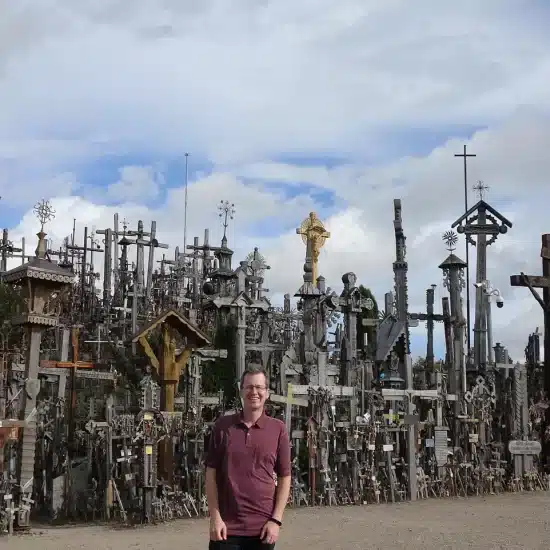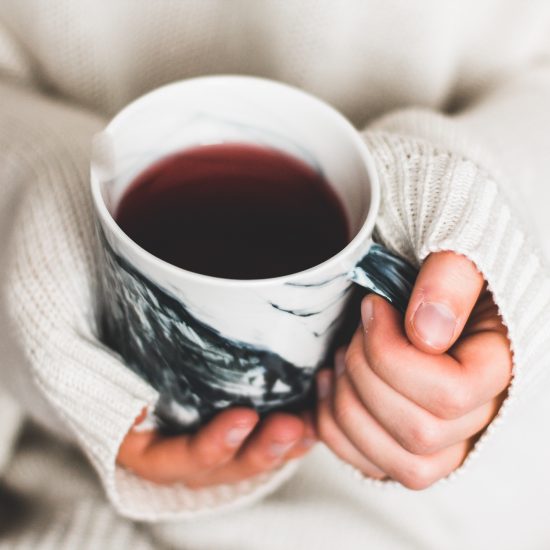You’ve had a heart attack or perhaps have been diagnosed with cancer. Family and friends have made a constant stream to your hospital bed. But as you lie there in that open-backed hospital gown, you are uncomfortable, depressed and vulnerable.

Marvin Schulz sands a cross that will eventually be given away by the artisans — the Cross makers of Seward, Neb. (Seward Cross Makers photo)
|
Clayton Kent of Seward, Neb., discovered a simple symbol that brings comfort to the hurting, the ill, the dying and the bereaved — the cross.
“You can’t take anything with you. But you can hold the cross in your hand and it brings great comfort,” he said.
Kent and an interdenominational band of craftspeople — the Seward Cross Makers — hand make each cross that’s given away or sold.
Rather than constructed of straight pieces of wood, the crosses are cut as one piece with the horizontal arms raised at each end and the bottom of the vertical section curved to the left. The shape — called a “palm cross” — allows an individual to comfortably grasp the cross and hold it for an extended period.
The Seward Cross Makers have created more than 41,000 crosses since the group was founded in May 2010. The artisans have given more than half of those away through local hospitals, nursing care facilities and mortuaries.
Kent discovered the ministry while visiting family in Hastings, Neb. His brother and nephew are part of a small group that creates the crosses for ill and bereaved members of their church, St. John’s Lutheran.
Kent already had been “soul searching” for the next chapter in his life. In the grocery business for most of his career, he had been retired for 10 years. He had traveled extensively in retirement and did not want to be tied down. But he also realized he had accomplished a lot in life. He needed and wanted to keep busy, he explained.
“I heard some of the stories from [his brother and nephew] about the effect the crosses seemed to have on people.”
At 75, he felt he wanted to do something meaningful and started making them in his garage. Then he helped found the volunteer group in Seward.
“We didn’t want to be tied down to just one church,” Kent said. By March 2012, the Seward Cross Makers had attracted 13 to 14 volunteers. About 20 individuals, all retirees, now assist regularly.
Most of the logs, primarily cedar and some oak and walnut, are donated by local folks. Then the group takes the rough logs to a man in Palmyra to be cut into lumber.
Since the beginning, volunteers would take dried lumber home and cut out crosses in their own workshops. In October 2013, they moved into a donated building that the group has refurbished. They rent out part of the facility for funding to help cover expenses. Two scroll saws are available for those who prefer to cut out crosses there.
Some volunteers cut crosses, and others sand them. Then a small heart is burned into the wood near the top of the vertical arm. All the crosses carry the small heart. Recently, other symbols have been added to the center of some crosses. A larger, open heart with a small cross at the top decorates some. Others include a pink ribbon to symbolize breast cancer. Last year, a local ovarian cancer support group requested a teal ribbon be added. The ribbons are burned into the wood and then hand painted.
The crosses are hand-dipped three times in polyurethane to protect the wood and to provide a smooth surface.
The group creates four sizes — large, medium, small and extra small. Kent’s brother and nephew developed the extra small size after learning about a young hospital patient who was dying and would not be released.
A card that Kent put together accompanies each cross to explain its purpose.
Not only does the ministry benefit those who receive the crosses. Any funds remaining after expenses are paid are given to local charities. Kent estimates the group has given about $30,000 to local nonprofits in four years.
And the volunteers themselves find a creative and fulfilling outlet. One man who cuts out crosses in his own workshop had lost his legs to complications from diabetes. A disabled woman, also in a wheelchair, polishes the crosses at home and inspects each before it is distributed or sold.
The Seward Cross Makers are a 501(c)3 not-for-profit with the corporate name, Cross of Life. Crosses not given away are sold through the Grow Nebraska website (grownebraska.org) and the group’s Etsy website, thecrossmakers.etsy.com. Crosses are $10 each. The cross makers are willing to sell 25 or more for $5 each to those who want to give them away.
The artisans also can be followed on Facebook at facebook.com/thecrossmakers. They may be contacted at thecrossmakers@yahoo.com.



